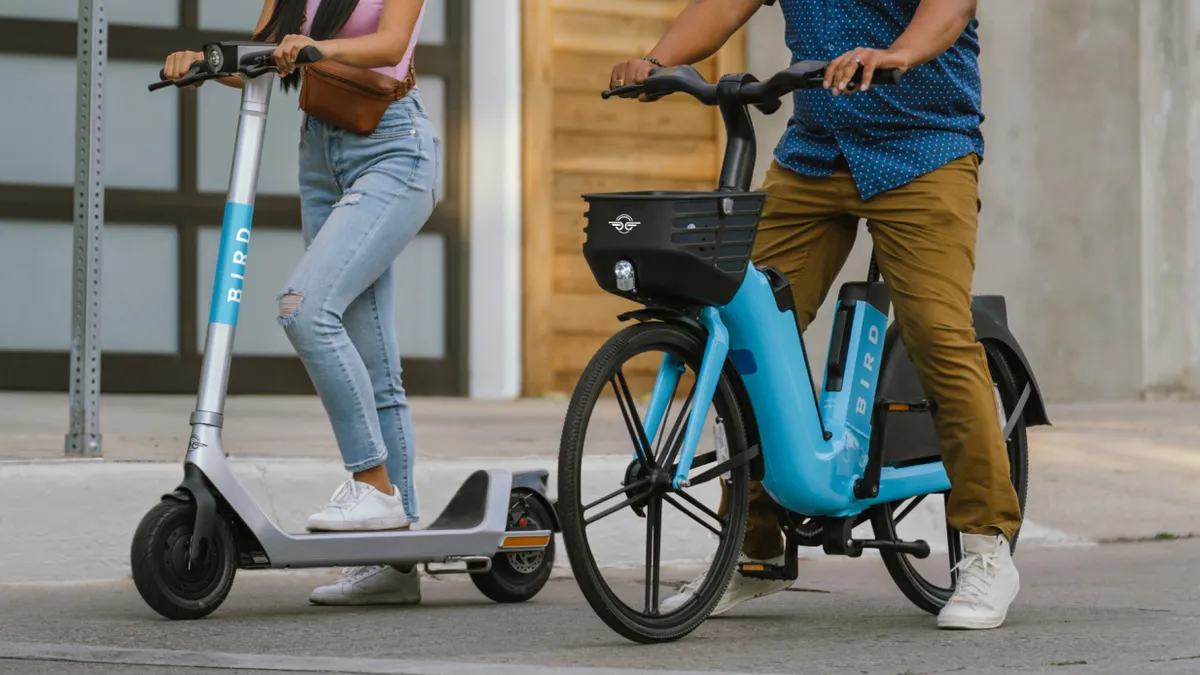Dive Brief:
- Micromobility operator Bird is shifting its strategy in its bid to become profitable, Shane Torchiana, the company’s recently appointed CEO, explained on a Monday afternoon third-quarter earnings call. Executives discussed optimizing its fleets through better supply and demand tracking and improving efficiency with swappable batteries, among many other initiatives.
- In a filing with the U.S. Securities and Exchange Commission on Friday, Bird revealed inaccuracies in its financial reporting for 2020 and 2021 due to issues with unrealized revenue related to customers’ pre-loaded “wallets.” As a result, Chief Financial Officer Ben Lu said in the earnings release that the company is withdrawing its previous fiscal year 2022 revenue guidance of $275 million to $325 million. The company is in the process of remediating the reporting issue.
- “Today, we're at an inflection point in our business,” said Torchiana, who served as company president before adding the CEO title as part of a September leadership overhaul. In addition to the management shakeup, key changes include streamlining its product and geographic footprint in favor of higher-margin markets and slashing operating expenses, Torchiana said.
Dive Insight:
Like many other operators in the micromobility sector, Bird has struggled in its pursuit of profitability. The company’s revenue reporting issue adds to recent challenges and signs of course correction, including layoffs and pulling out of certain markets, including some small- and mid-sized cities in the U.S.
Now, the company is trying to lay a new path forward. “Recently, we've doubled down on putting cities at the center of everything we do. Building on progress made this year, we plan to continue to work closely with and listen to our city partners to understand their pain points deeply,” Torchiana said in prepared remarks, acknowledging ongoing problems such as safety and clutter.
During the third quarter, the company recorded a net loss of $9.8 million, versus $42.1 million during the same period last year. Revenue rose to $72.9 million, a 19% year-over-year increase.
Bird told Smart Cities Dive following the exits that many cities have “convoluted and expensive regulations that favor car travel and put the long-term viability of the shared micromobility industry into question.” Executives said the company would be able to reallocate vehicles from shuttered markets to help meet demand in higher-growth areas.
Torchiana said that Bird currently operates in a little less than one-third of addressable cities throughout North America, Europe, the Middle East and Africa. “The bulk of the remaining two-thirds are cities that don't yet have mobility programs,” he said, noting Bird does not operate in Boston, Dallas, Houston and Philadelphia.
“It’s only a matter of time until the political leaders in those cities that are moving more slowly catch up and embrace the sustainable transportation options that their constituents are demanding.” He also noted that operations in New York City only have partial coverage, “so there's quite a bit of room to grow our supply to match the demand there.”
The company, which went public last year, is also at risk of being delisted from the New York Stock Exchange, as its stock price has been below $1 for more than five months. Lu outlined several scenarios that could remediate the situation, including a potential reverse stock split.












